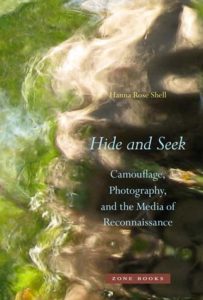“A highly original and imaginative piece of scholarship.” — Martin Jay, University of California, Berkeley
Camouflage is an adaptive logic of escape from photographic representation. In Hide and Seek, Hanna Rose Shell traces the evolution of camouflage as it developed in counterpoint to technological advances in photography, innovations in warfare, and as-yet-unsolved mysteries of natural history. Today camouflage is commonly thought of as a textile pattern of interlocking greens and browns. But in Hide and Seek it reveals itself to be much more–a set of institutional structures, mixed-media art practices, and permutations of subjectivity, that emerged over the course of the twentieth century in environments increasingly mediated by photographic and cinematic intervention.
Through a series of fascinating case studies, Shell uncovers three conceptually linked species of photographic camouflage–the static, the serial, and the dynamic–and shows how each not only reflects the type of photographic reconnaissance it was meant to counter, but also contains aspects of the previously developed species. Hide and Seek develops its argument from the material forms camouflage has left behind: photomontages, paper blankets, stuffed rabbits, ghillie suits, and instructional films. Beginning with natural history and figurative art in the late nineteenth-century, continuing through the rise of aerial warfare in World War I, and onto the cinematic techniques designed to train snipers and civilians during World War II, this book is both a history and a theory of the drive to hide in plain sight.
